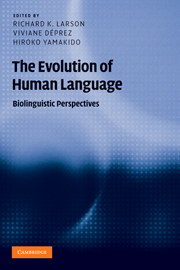Book contents
- Frontmatter
- Contents
- Figures
- Contributors
- Acknowledgments
- Introduction
- 1 The faculty of language: what is it, who has it, and how did it evolve?
- Part I Language architecture
- Part II Language and interface systems
- Part III Biological and neurological foundations
- Part IV Anthropological context
- 13 A putative role for language in the origin of human consciousness
- 14 On two incompatible theories of language evolution
- 15 On the evolution of language: implications of a new and general theory of human origins, properties, and history
- Notes
- References
- Index
15 - On the evolution of language: implications of a new and general theory of human origins, properties, and history
Published online by Cambridge University Press: 05 June 2012
- Frontmatter
- Contents
- Figures
- Contributors
- Acknowledgments
- Introduction
- 1 The faculty of language: what is it, who has it, and how did it evolve?
- Part I Language architecture
- Part II Language and interface systems
- Part III Biological and neurological foundations
- Part IV Anthropological context
- 13 A putative role for language in the origin of human consciousness
- 14 On two incompatible theories of language evolution
- 15 On the evolution of language: implications of a new and general theory of human origins, properties, and history
- Notes
- References
- Index
Summary
Introduction
Human language apparently has the structure and properties expected of a device produced by natural selection (Jackendoff 2002: chap. 6; Pinker and Jackendoff 2005). However, we continue to lack a clear theoretical explanation of how or why language evolved uniquely in the human lineage. Equivalently, we have not understood the circumstances under which language might have become adaptive in human ancestors but not in any other of the many thousands of large animal species. Though many theories of language evolution have been proposed in the ca. 150 years since Darwin, none has answered these questions convincingly nor born the fruit expected of a robust theory.
I briefly summarize here a body of new theoretical work which predicts that elite language should evolve uniquely in the humen lineage. These predictions arise simply, parsimoniously. Moreover, they account economically for all elite human communicative behaviors, not merely speech. This theory also suggests new perspectives on the structure of language and of the mind.
The concept of elite capabilities introduced above is vital. Various constraints impose adaptive trade-offs, resulting in elite execution of one task at the expense of merely serviceable (or negligible) capacity for another. For example, dolphins and horses are both mammals that can swim. Dolphins are elite swimmers but horses are not. All animals can (ostensibly; below) exchange information using symbolic, combinatorially generated and parsed gestures (manual/physical or vocal). Humans have elite skill at such exchanges, while no other animals (apparently) do.
Information
- Type
- Chapter
- Information
- The Evolution of Human LanguageBiolinguistic Perspectives, pp. 211 - 224Publisher: Cambridge University PressPrint publication year: 2010
Accessibility standard: Unknown
Why this information is here
This section outlines the accessibility features of this content - including support for screen readers, full keyboard navigation and high-contrast display options. This may not be relevant for you.Accessibility Information
- 6
- Cited by
